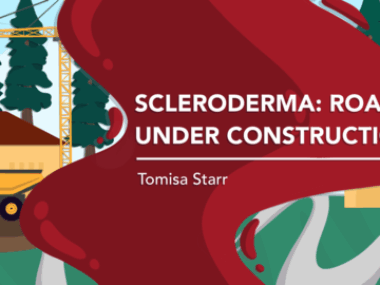How scleroderma broke my heart in more ways than one
Managing scleroderma and heart disease is physically and emotionally taxing
Written by |

For years now, I’ve lived with a broken heart. At times, it’s physically painful. My discomfort includes aches, sharp and stabbing pains, fluid retention, swelling in my extremities, and difficulty breathing.
But living with a dysfunctional heart is nothing compared with the emotional toll my heart disease has left in its wake. It’s wreaked havoc on my life and relationships and forced me to comply with a body that doesn’t feel like my own.
This situation begs an answer to the question: How does one mend a broken heart?
After I was diagnosed with systemic scleroderma in 2001 and interstitial lung disease in 2002, my body and brain had to relearn how to function. Dealing with symptoms and medication side effects turned my life into a game of chess. I felt I had to stay two or three steps ahead to combat potential threats.
It took some time and quick thinking, but eventually, I learned what to expect from scleroderma. I became so good at being sick that I’d anticipate symptoms before they flared up. This awareness helped me make necessary adjustments. For example, if it was humid out, I’d stay indoors and keep hydrated to avoid breathing issues. If I gained a few pounds, I’d avoid salt and fried foods to help reduce fluid retention.
Being sick became my job, and over the years, I became a professional at it — until I developed heart disease in 2016 as a result of scleroderma.
Matters of the heart
I remember that period of my life vividly. My skin and lungs were being treated with medications and lifestyle changes, and I was doing pulmonary rehabilitation and mild stretching and physical therapy for my hands.
Looking back, it was the calm before the storm. Every so often, out of nowhere, my fingertips would start to tingle. My tongue would become numb, and I’d get tunnel vision. These symptoms would accumulate seconds before my heart started to pound out of my chest for no rhyme or reason. Sometimes it happened while shopping for paint in a craft store. Other times, I’d just eaten a sandwich or taken a shower.
There was no pattern to these episodes, but the more they happened, the longer it took for my heart to return to its normal rhythm. The first few times, I chalked it up to a fluke, but these episodes started happening more frequently and began to interfere with my daily routine and mental health. I feared having an episode and wondered how long the next one might last.
One day, I’d just returned from the grocery store when I felt a rush of anxiety that resulted in a moment of breathlessness. Immediately, my heart began pounding faster than ever before. My mom called 911, and when paramedics arrived, I heard them shouting that I was at 210 beats per minute. The word “tachycardia” fluttered around the room. I began shaking from the stress of my excessive heart rate and was quickly strapped to a gurney, loaded into the ambulance, and whisked off to the emergency room.
At the ER, doctors were asking me questions left and right, mostly about scleroderma. All the while, one thought kept emerging from the fog of the chaos around me: “Is this really my life now?”
For some reason, the reality of my situation became clear in those moments of panic and fear. I understood that my life would always be comprised of situations of duress. At that moment, my heart broke all over again. But this time, it wasn’t because of the physical issues that had sent me to the hospital, but because I realized that my status quo was being a professional patient.
Eventually, my heart issues were rectified with medication, diet, and exercise. Unfortunately, over the past few years, flare-ups have reared their ugly head.
The biggest thing I took away from that cardiac event in 2016 was the importance of remaining calm, even if that’s the last thing I want to do. The less stress I put on my body and heart, the easier it is for clinicians to work out the kinks. This approach in turn allows my body to decompress from the stress of the physical event.
I now live with physical scarring, or fibrosis, in my heart and lungs, as well as emotional scarring that only I can see. These scars will probably last a lifetime, but I try to work through my baggage by telling my story. Writing helps me to grieve the life I once had.
Matters of the heart are complicated, affecting us physically and emotionally. But by learning to make adjustments to my self-care, hobbies, and medical treatment, I can keep my heart beating to the beat of its own drum.
Note: Scleroderma News is strictly a news and information website about the disease. It does not provide medical advice, diagnosis, or treatment. This content is not intended to be a substitute for professional medical advice, diagnosis, or treatment. Always seek the advice of your physician or other qualified health provider with any questions you may have regarding a medical condition. Never disregard professional medical advice or delay in seeking it because of something you have read on this website. The opinions expressed in this column are not those of Scleroderma News or its parent company, Bionews, and are intended to spark discussion about issues pertaining to scleroderma.







Dona Robinson
Thanks for sharing. You are young and courageous and adequately express my sentiments. It is so hard to explain to family and friends, why in a minute you can get from exuberance ready to conquer all, to debilitated. On this site, I feel so comforted to know I'm not alone.
Keep on your quest. My prayers are with you.
Leighanne Gledhill
Thank you Amy for sharing your experience and thoughts of living with scleroderma, and how you are managing. Although a frightening read it was heartening. The psychological challenge of living with a chronic potentially debilitating condition as scleroderma can be overwhelming at times. I am finding managing my diet and exercise give me relief and strength. Taking action to help my body, enhances me to think positive, which enhances my outlook.
johnny lopez
Amy. You inspire me to keep on going. This condition affects the whole body and affects the mental well being of trying to be normal. Thanks again for sharing. I don't feel so alone now.